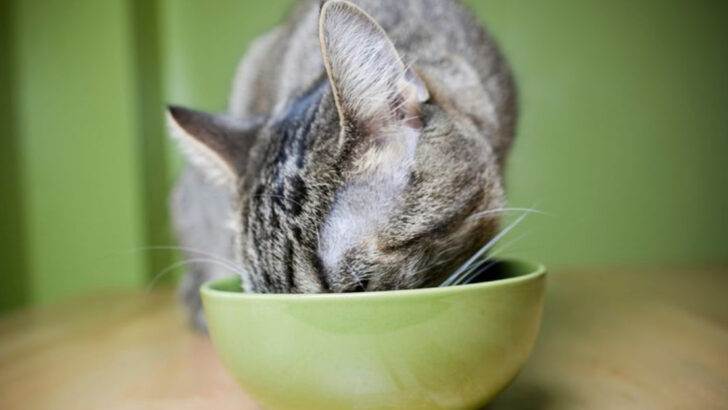Some cats act like they haven’t eaten in weeks—even if they just polished off a full bowl of food. The dramatic meows, the desperate stares, the sneaky attempts to steal your dinner—it’s all part of their endless hunger campaign.
But is your cat truly starving, or is something else going on? Feline appetites are tricky, and sometimes that bottomless pit of hunger isn’t just about food. From medical mysteries to pure cat logic, there are plenty of reasons why your furry friend is always begging for more.
It’s not just about refilling the food bowl. Your cat might be trying to tell you something—about their health, their habits, or even their emotions.
Before you fall for those big, pleading eyes again, let’s break down the real reasons behind your cat’s constant cravings. Some might surprise you!
Hyperthyroidism
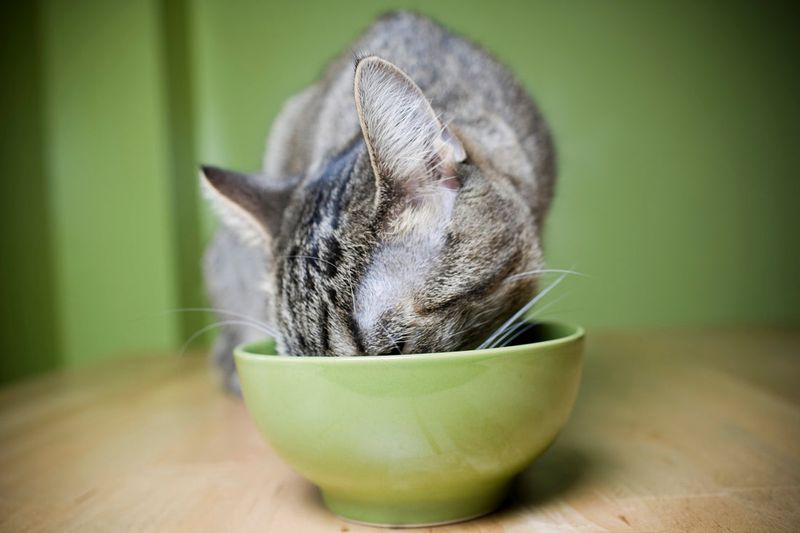
Hyperthyroidism is a common condition in older cats that can lead to increased hunger. This disorder occurs when the thyroid gland produces too much hormone, accelerating your cat’s metabolism. You may notice weight loss despite increased food intake.
Monitoring your cat’s behavior and weight is essential. If you suspect hyperthyroidism, consulting with a veterinarian is crucial. Blood tests can confirm the diagnosis, and treatment options are available, including medication or surgery to manage the condition effectively. Keeping an eye on these signs can help in early detection and treatment.
Your cat, despite its hunger, might be suffering internally.
Diabetes Mellitus

Diabetes Mellitus in cats can result in constant hunger due to the body’s inability to process sugar properly. The cells starve despite the cat eating more, leading to weight loss and increased appetite.
This condition often requires lifelong management, including dietary changes and possibly insulin injections. Regular vet check-ups and monitoring blood glucose levels are integral components of managing a diabetic cat’s health.
By understanding the symptoms, you can ensure your cat receives timely care, maintaining a better quality of life. Increased thirst and urination often accompany the hunger, so watch for these signs.
Intestinal Parasites
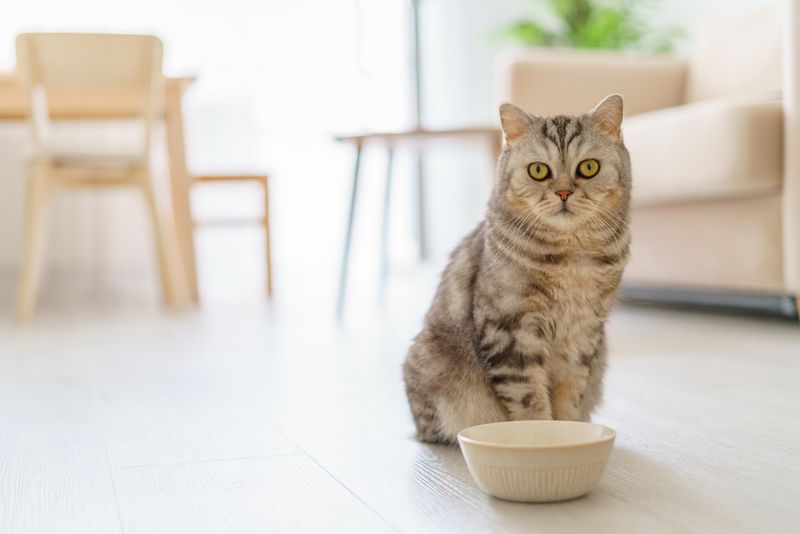
Intestinal parasites like worms can make your cat feel hungrier than usual. These parasites consume nutrients meant for your cat, leaving it feeling unfulfilled and hungry.
Regular deworming and vet checks are vital to prevent and treat infestations. Sometimes, you might notice visible worms in your cat’s stool or vomit. Ensuring your cat lives in a clean environment and preventing it from hunting can reduce exposure to these parasites.
Consulting your vet for the right deworming schedule is imperative to keep your feline friend healthy and content.
Poor Quality Diet
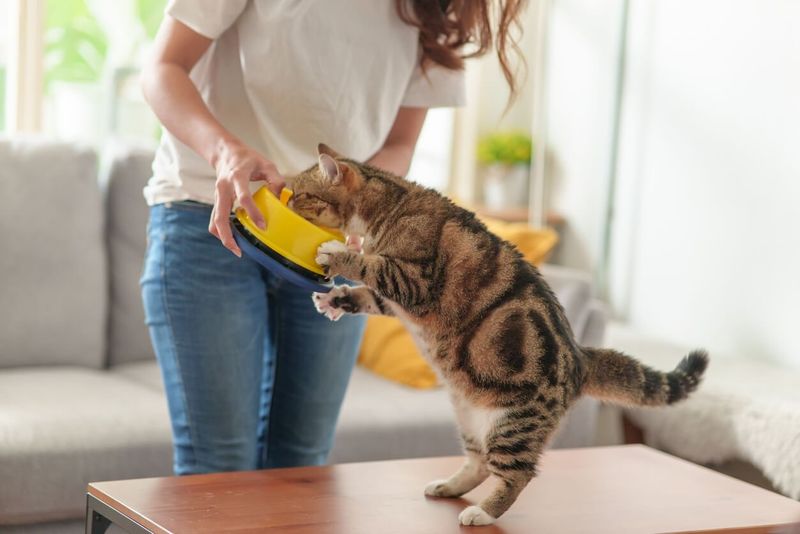
Feeding your cat a poor quality diet can leave it feeling unsatisfied and constantly hungry. Low-quality cat food may lack essential nutrients, causing your cat to eat more to compensate.
Switching to a high-quality diet, rich in proteins and balanced nutrients, can improve your cat’s overall health and reduce its hunger pangs. Always check the ingredients list on cat food packages and consult your vet for recommendations.
Providing a diet that meets your pet’s nutritional needs is the foundation for reducing unnecessary hunger and promoting a healthy lifestyle.
Boredom
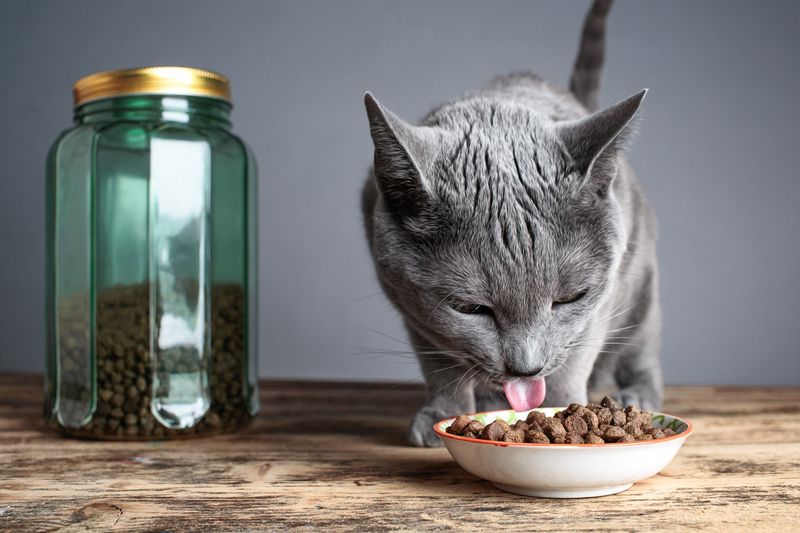
Cats, just like humans, can eat out of boredom. If your cat lacks stimulation, it might turn to food as a way to pass the time or entertain itself.
Providing interactive toys, regular playtime, and engaging activities can help alleviate boredom. Ensure your cat has access to a stimulating environment with opportunities to climb, scratch, and explore.
Creating a varied and engaging routine not only reduces hunger but also enhances your cat’s mental well-being, keeping it lively and content.
Stress and Anxiety
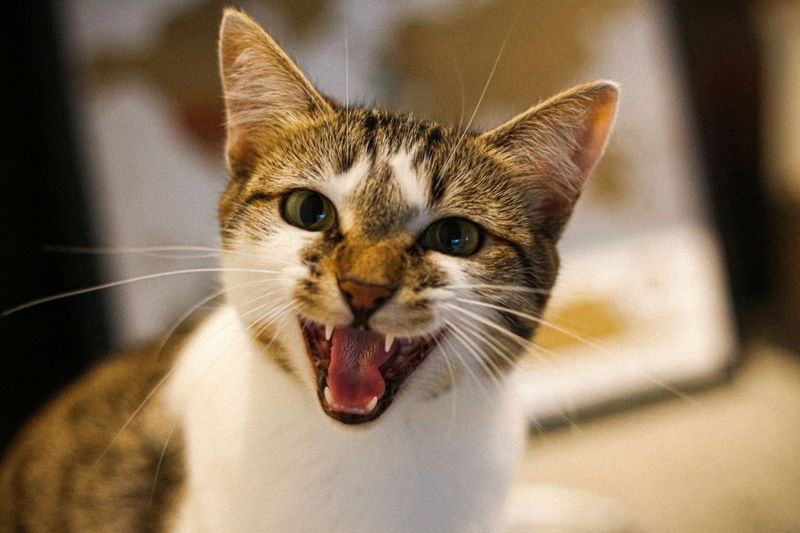
Stress and anxiety can lead to increased hunger in cats as a coping mechanism. Changes in the home environment, like moving or the addition of a new pet, can trigger this response.
Identifying stressors and minimizing them is crucial. Creating a safe and comforting space for your cat to retreat to can help alleviate anxiety. Consider using calming aids like pheromone diffusers.
By addressing the root causes of stress, you can help your cat feel more secure and reduce its anxiety-driven hunger. Regular vet visits can also ensure there are no underlying health issues.
Pregnancy or Lactation
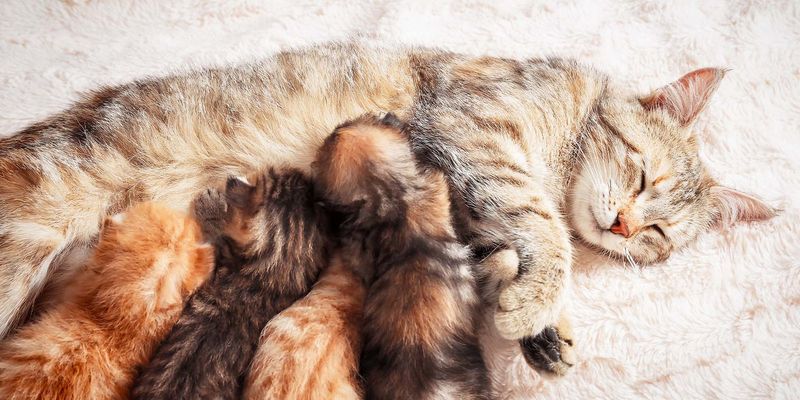
Pregnant or lactating cats naturally require more food to support their own nutritional needs and those of their kittens. This increased need for calories makes them seem constantly hungry.
Providing a nutrient-rich diet formulated for pregnant or nursing cats is essential. These diets ensure they receive adequate energy and nutrients to maintain their health and support their kittens.
Consulting with your vet can guide you in selecting the appropriate food and portion sizes during this crucial period. Ensuring your cat’s nutritional needs are met will keep her and her offspring healthy.
Age-related Changes
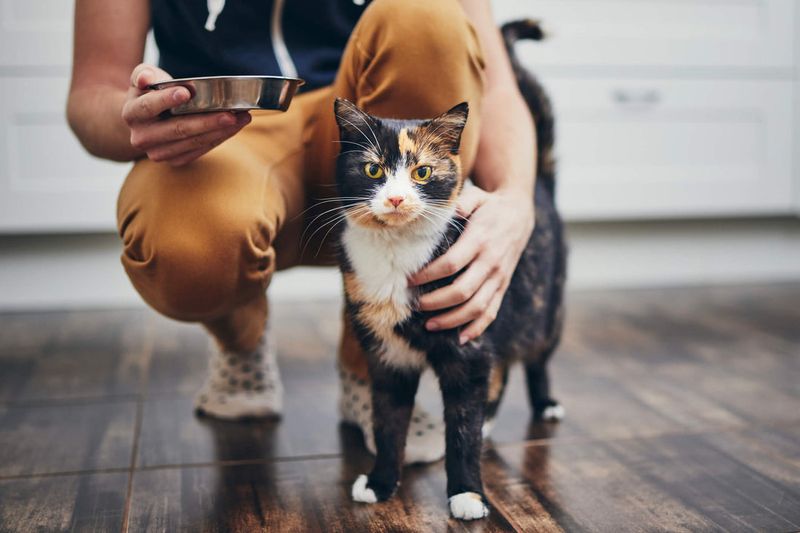
As cats age, they may experience changes in metabolism and energy levels, which can affect hunger. Older cats might need more frequent, smaller meals to maintain their energy.
Adjusting their diet to accommodate these changes can help manage hunger. Senior cat food formulas are designed to meet the nutritional needs of aging felines, supporting joint health and weight management.
Regular vet check-ups are vital to monitor your cat’s health and dietary needs as it ages. Providing a comfortable and supportive environment can enhance their quality of life.
Hyperactivity
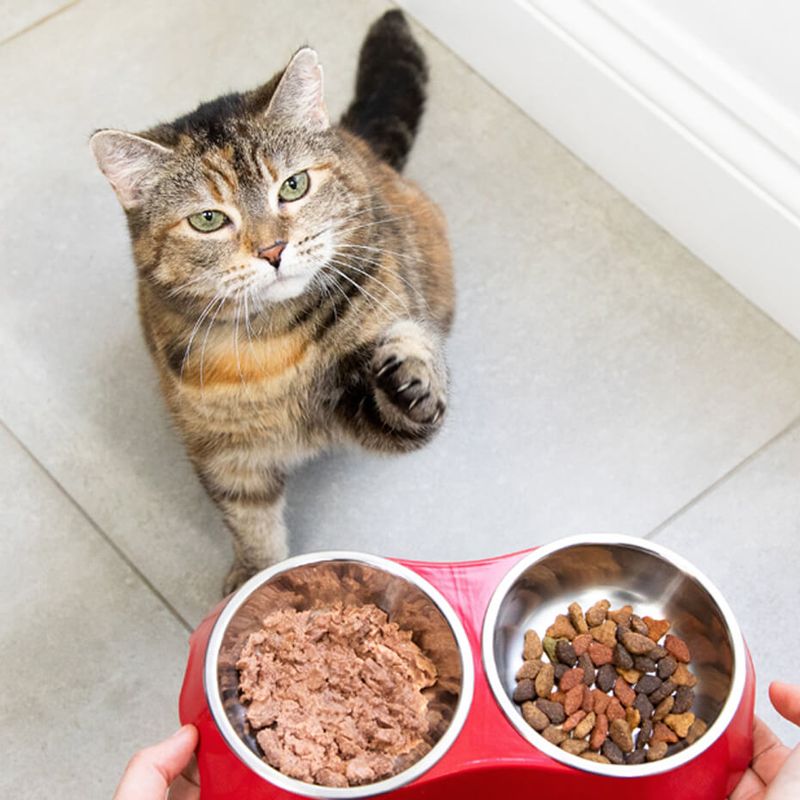
Hyperactive cats burn more energy and might appear hungrier as a result. These felines engage in more physical activities, requiring additional calories to maintain their energy levels.
Interactive play sessions and a balanced, high-protein diet can help meet the nutritional demands of an active cat. Providing activities that stimulate both their body and mind can prevent unhealthy weight loss.
Ensuring your cat receives enough exercise and nutrients is crucial in managing hunger and maintaining a playful, healthy lifestyle. Consult with your vet to tailor a diet suitable for your active feline.
Medication Side Effects
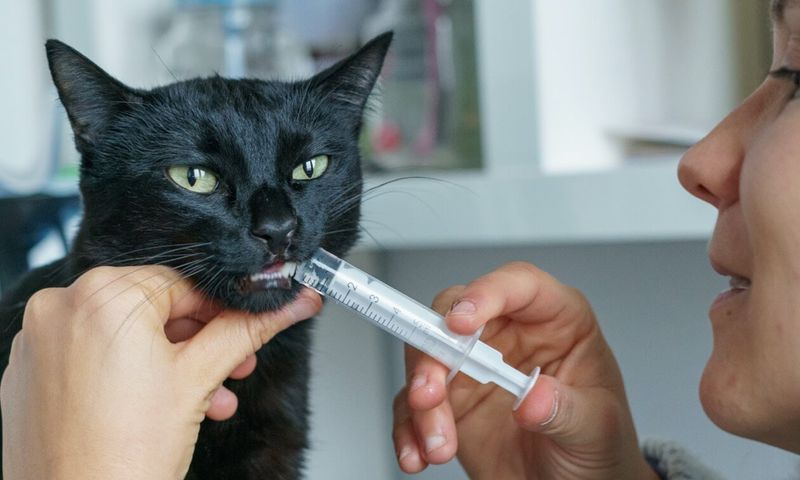
Some medications can cause increased appetite as a side effect. If your cat is on medication and appears hungrier than usual, consult your vet.
Understanding the medication’s effects can help you manage your cat’s diet and prevent overeating. Your vet may adjust the dosage or suggest dietary changes to balance your pet’s nutritional intake.
Awareness of these side effects allows you to take proactive steps in managing your cat’s health. Keeping open communication with your vet ensures your cat’s treatment plan remains effective and safe.
Malabsorption
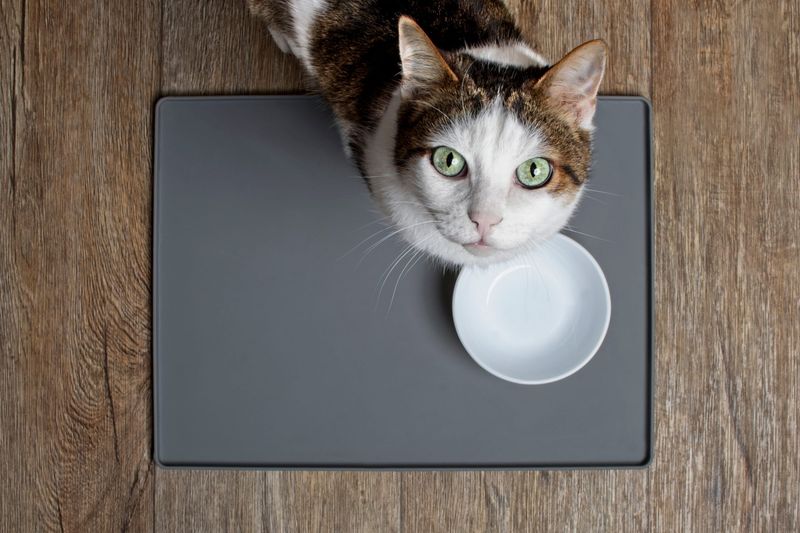
Malabsorption occurs when a cat’s intestines can’t absorb nutrients properly from food, leading to constant hunger. This condition may result in weight loss despite increased food intake.
Diagnosing malabsorption typically involves vet consultations and tests to determine the underlying cause. Treatment often includes dietary adjustments or supplements to aid nutrient absorption.
Addressing malabsorption is crucial for your cat’s health and well-being. Regular vet visits and monitoring your cat’s weight and behavior help in managing this condition effectively, ensuring your furry friend remains healthy and nourished.
Feeding Schedule
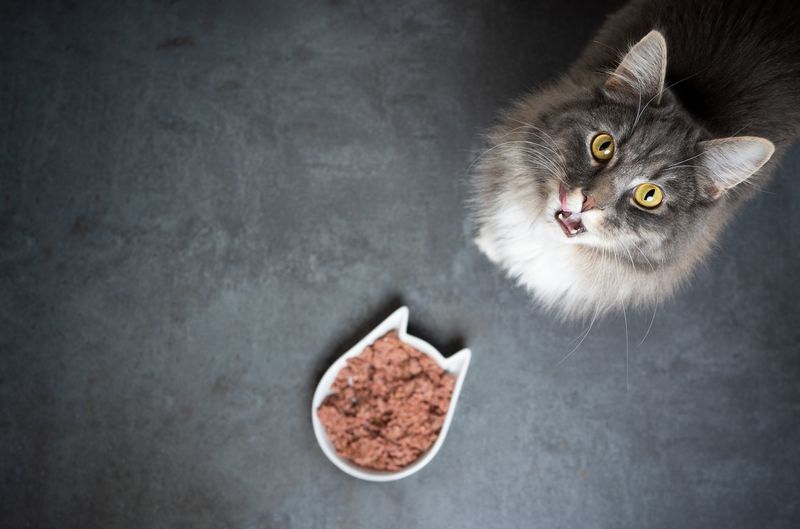
Irregular feeding schedules can make your cat feel hungry if meals are delayed or skipped. Cats thrive on routine, and disruptions can lead to anxiety-driven hunger.
Establishing a consistent feeding schedule can help manage your cat’s hunger and stress levels. Feeding your cat at the same times daily ensures it knows when to expect meals, reducing anxiety.
By keeping a regular feeding routine, you promote a sense of security and well-being in your cat. This consistency helps maintain a healthy appetite and prevents overeating or begging behaviors.
Competition for Food
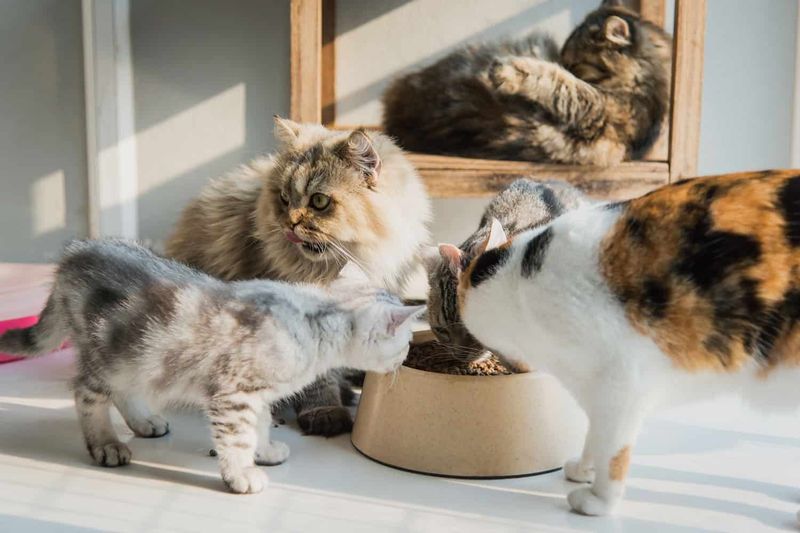
In multi-cat households, competition for food can make a cat eat faster and appear hungrier. Cats may worry about not getting enough food, leading to increased hunger and anxiety.
Providing separate feeding areas and ensuring each cat has its own food bowl can reduce competition. Observing mealtime interactions can help identify any issues between your pets.
By minimizing competition, you can create a peaceful feeding environment, reducing stress and promoting healthy eating habits. Ensuring each cat receives adequate nutrition helps maintain their overall health and happiness.
Secret Midnight Adventures
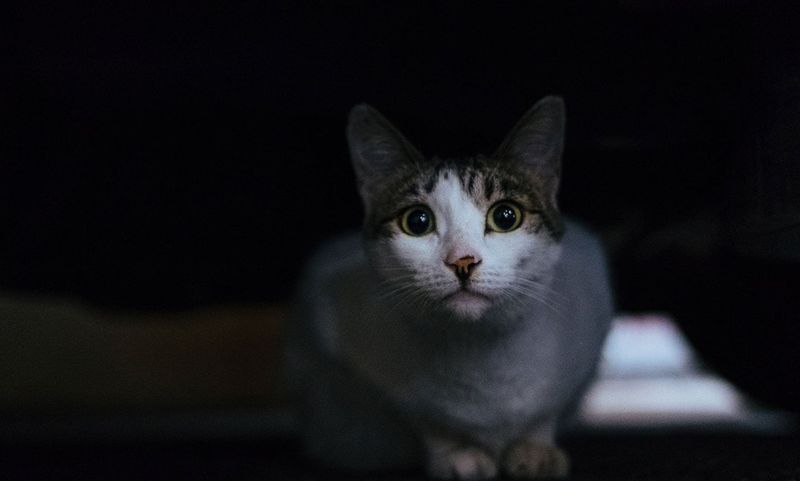
Your cat might be leading a double life as a midnight adventurer, exploring the neighborhood under the cover of darkness. This could mean they’re burning extra calories, hence the constant hunger.
Imagine your feline scaling fences, investigating new territories, and socializing with other night owls. These escapades can be quite the workout!
Back home, they recharge with food, replenishing energy spent on their secretive journeys. Embrace your cat’s adventurous spirit by providing engaging playtime during the day. This may just curb their need for nocturnal escapades and their insatiable quest for food.

